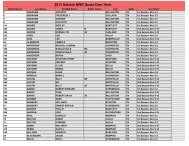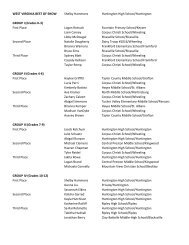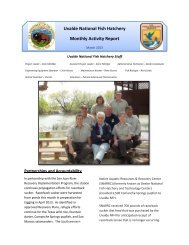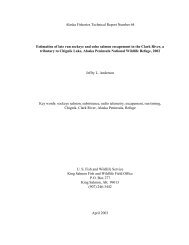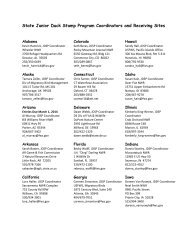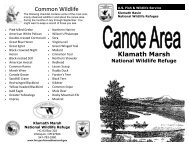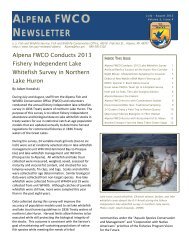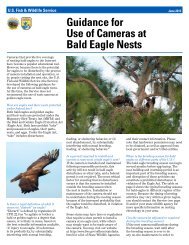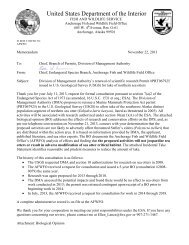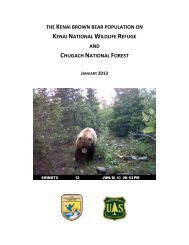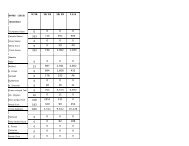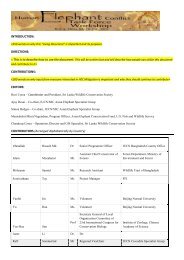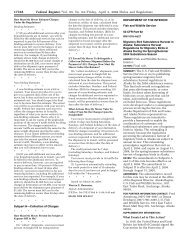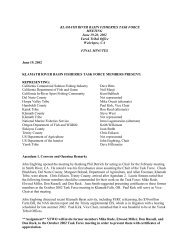FOR IMMEDIATE RELEASE Contacts: John Hartig, 313-717-7483 ...
FOR IMMEDIATE RELEASE Contacts: John Hartig, 313-717-7483 ...
FOR IMMEDIATE RELEASE Contacts: John Hartig, 313-717-7483 ...
- TAGS
- hartig
- www.fws.gov
You also want an ePaper? Increase the reach of your titles
YUMPU automatically turns print PDFs into web optimized ePapers that Google loves.
<strong>FOR</strong> <strong>IMMEDIATE</strong> <strong>RELEASE</strong> <strong>Contacts</strong>: <strong>John</strong> <strong>Hartig</strong>, <strong>313</strong>-<strong>717</strong>-<strong>7483</strong><br />
June 24, 2004 Scott Flaherty, 612-713-5309<br />
EA04-52<br />
<strong>John</strong> <strong>Hartig</strong> Selected as First Full-Time Manager for the Detroit River<br />
International Wildlife Refuge<br />
As a young boy in the 1960s, <strong>John</strong> <strong>Hartig</strong> relished his days spent fishing in the Detroit River in<br />
southeast Michigan. Today, the U.S. Fish and Wildlife Service announced that the 51 year-old<br />
Trenton, Mich., native will become the first full-time refuge manager at the Detroit River<br />
International Wildlife Refuge,<br />
<strong>Hartig</strong> begins his new job July 10. As refuge manager, he will oversee operations on North<br />
America’s only international wildlife refuge which will conserve, protect and restore habitat for<br />
29 species of waterfowl, 65 kinds of fish and 300 species of migratory birds on more than 5,000<br />
acres along the lower Detroit River in southeast Michigan. <strong>Hartig</strong> replaces Doug Brewer who<br />
was on temporary assignment from Ottawa National Wildlife Refuge in Ohio. Until a more<br />
permanent refuge office can be established, <strong>Hartig</strong> will be stationed at the Environmental<br />
Protection Agency’s Large Lakes Research Station on Grosse Ile.<br />
“I’m thrilled to be a member of the U.S. Fish and Wildlife Service and help shape the future of<br />
this magnificent resource,” <strong>Hartig</strong> said. “The Detroit River refuge is a huge source of community<br />
pride. Over the decades, many local residents have lost their connection to the outdoors. The<br />
refuge is helping people to reconnect to the river and its resources. Best of all, there is a huge<br />
base of local support for the refuge and what it brings to southeast Michigan.”<br />
<strong>Hartig</strong> brings more than 25 years of experience in environmental science and natural resource<br />
management to his new position. For the past five years, he has served as River Navigator for<br />
the Greater Detroit American Heritage River Initiative. As River Navigator he worked with<br />
Detroit River communities and businesses to identify and implement high priority projects that<br />
foster environmental stewardship, promote environmentally sustainable economic development,<br />
and celebrate history and culture. Prior to becoming River Navigator, he spent 14 years working<br />
for the International Joint Commission on the Canada-U.S. Great Lakes Water Quality<br />
Agreement.<br />
(More)
(2)<br />
"I have enjoyed being Detroit River Navigator and it's good to know that the momentum we have<br />
achieved for the American Heritage River (AHR) will continue under the direction of the<br />
Metropolitan Affairs Coalition (MAC),” <strong>Hartig</strong> said. “As refuge manager I see MAC and its<br />
AHR Initiative as a valuable partner in collaborating to enhance the river and wildlife habitat."<br />
He has authored or co-authored more than 70 publications on the Great Lakes, including coediting<br />
the book, "UNDER RAPS: Toward Grassroots Ecological Democracy in the Great Lakes<br />
Basin" and a new book, “Honoring Our Detroit River, Caring for Our Home.” <strong>John</strong> has received<br />
numerous awards for his many years of work on Great Lakes’ issues including the 2003<br />
Anderson-Everett Award from the International Association for Great Lakes Research, the 2003<br />
Community Luminary Award from the DTE Energy Foundation, and the 1993 Sustainable<br />
Development Award for Civic Leadership from Global Tomorrow Coalition.<br />
“<strong>John</strong> brings very unique talents to a unique wildlife refuge. We’re fortunate to have him as part<br />
of the Service’s refuge team.” said Barry Christenson, area refuge supervisor for the U.S. Fish<br />
and Wildlife Service’s Great Lakes-Big Rivers Region headquarters in Minneapolis, Minn.<br />
The Detroit River International Wildlife Refuge was established in December 2001. The refuge<br />
is the result of an unprecedented partnership of government agencies, businesses, conservation<br />
groups, landowners and private citizens on both sides of the border. Located at the intersection<br />
of the Atlantic and Mississippi Flyways, an estimated three million ducks, geese, swans and<br />
coots migrate annually through the region. More than 300,000 diving ducks stop each year to<br />
feed on wild celery beds in the river. Despite being a heavily traveled corridor for Great Lakes’<br />
shipping, the Detroit River is also known for its duck hunting and fishing, activities the Service<br />
plans to continue on parts of the refuge.<br />
The U.S. Fish and Wildlife Service is the principal federal agency responsible for conserving,<br />
protecting and enhancing fish, wildlife and plants and their habitats for the continuing benefit of<br />
the American people. The Service manages the 95-million-acre National Wildlife Refuge<br />
System, which encompasses 544 national wildlife refuges, thousands of small wetlands and other<br />
special management areas. It also operates 69 national fish hatcheries, 63 Fish and Wildlife<br />
Management offices and 81 ecological services field stations. The agency enforces federal<br />
wildlife laws, administers the Endangered Species Act, manages migratory bird populations,<br />
restores nationally significant fisheries, conserves and restores wildlife habitat such as wetlands,<br />
and helps foreign governments with their conservation efforts. It also oversees the Federal<br />
Assistance program, which distributes hundreds of millions of dollars in excise taxes on fishing<br />
and hunting equipment to state fish and wildlife agencies.<br />
-FWS-



